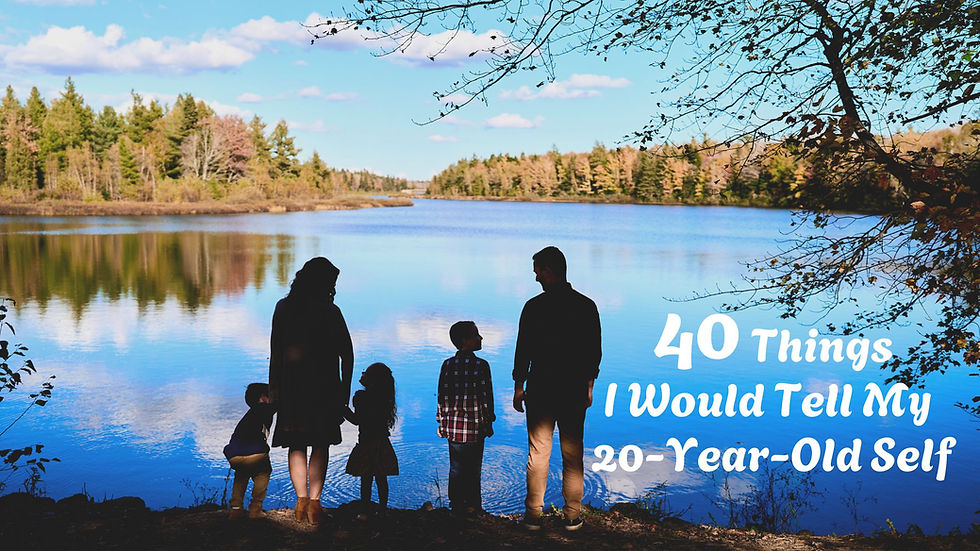A Legacy of Laughter
- chantaljmacdonald
- Feb 3, 2023
- 4 min read
It’s an injustice to attempt to boil down someone’s life to one thought. One idea. One reflection.
And yet we do. Or at least we try to.
When we lose someone, we grapple for some overarching trait that signifies who they were, what they stood for, how they made us feel.
We want to sum them up into something bite-sized and palatable that we can carry in our pocket to be pulled out and pressed close when grief feels unbearable.
But often life is not so simple.
It is not a bestselling novel with a neatly written arc.
We may be the heroes and heroines of our story, but real life is often messy, and complicated, and filled with ups and downs. It’s minutes and hours and days of mundane routine interspersed with moments of spectacular.
Summing up a person’s existence in any capacity overlooks the complexity of their life.
But perhaps that’s okay.
Perhaps a documentation of the depth the dash between birth and death dates represents is impossible.
And perhaps the reflection on a person’s life is less about them and how they lived, and more about we who remain and what they taught us. How did their existence impact us? How did their presence make us better or our lives richer or our spirit more resilient?
My grandfather, Donald Joseph Lavigne, was ninety-four when he passed away in his home, surrounded by loved ones.
As one of eighteen grandchildren, my relationship with my Papa was positive and yet distant. I did not talk to him often or even see him on a regular basis. We did not live in the same city (or province for a while) and the older that he got, the less that he travelled.
But the times that we did spend together were poignantly marked by laughter and playfulness.
I have more than once remarked that I have never had a serious conversation with him.
It’s not that I didn’t try.
There were certainly moments of his life marked with pain and heartbreak where I tried to connect with him in that way—the passing of his wife and my grandmother, the loss of his daughter to cancer, the tragic death of my cousin, even his own diagnosis and health decline.
But Papa’s response—his natural instinct—was to either brush it off with a laugh or joke or shut down and say nothing. “I don’t talk about things like that,” he once said. I assume it was the way he was raised or perhaps a sum of his life experiences. Either way, expression of deep emotion seemed inaccessible to him.
I didn’t push.
I came to expect and anticipate the nature of our visits. I found myself matching him. He was silly? I would be silly. He wanted to dance? I could surely keep up with a man three times my age. He wanted to tease? I could tease right back.
Without realizing it, my time with my grandfather made my spirit a little lighter, a little more playful than is my typical nature.
He was not perfect, but he was good for me in that way.
As I worked on writing his eulogy, I’ve realized that my experience with him is not unique. This was the way that he was with everyone.
The stories and memories that were shared with me all had a trademark punch line or thread of humour. Donald Lavigne was a jovial man with a mind for tinkering and saving a buck. He man with a thick French accent and little ability to speak the language with any finesse, if at all. A man for whom great joy could be found in the refusal to give a straight answer or in being more silly than the situation called for.
He loved to tease, even if (especially if) it was frustrating to the person trying to get him to be serious.
He laughed so much.
My mind does not need to work hard to hear his raspy laugh, struggling to catch his breath, eyes dancing with mirth.
Our large family has lost its patriarch and with his death I find myself also mourning the passing of time.
Because death makes us look back. For better or worse, it forces us to remember.
So how do you begin to encapsulate ninety-four years of life?
You can’t.
But you can do your best to honour the memory of your lost loved ones by appreciating how they lived.
If my Papa has left any legacy worth clinging to, it is the value of laughter.
I smile a lot. I occasionally chuckle. But the times that I belly laugh are so rare.
I think that’s to my detriment.
Papa lived a long life. He had a full head of hair, lots of energy, and few health issues throughout his life. When asked his secret, he would always give a silly answer.
“I chew my food.”
“I don’t drink water.”
“I don’t use soap.”
We would brush him off with a shake of our heads, but I wonder if laughter was the real secret. Was his carefree, playful spirit the very thing that kept him young?
Madeleine L’Engle wrote that “A good laugh heals a lot of hurts.” So in his absence I not succumb to the sorrow, but instead will choose to honour the way that he lived. Today I will be a bit silly; I’ll tell a joke; I’ll try to make someone else laugh; I’ll laugh at myself.
And when I do, I will know that my Papa’s memory lives on through me.
And perhaps my life will be all the better for it.




Comments